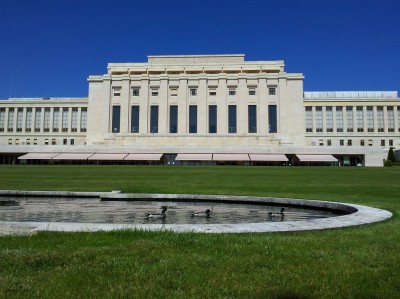27th May 2013 Geneva, Switzerland
June too soon
There was a time not so long ago when the Geneva sun shone happily throughout spring time, when kinder colleagues used to mistake me for an intern and the June Human Rights Council session actually began in June.
This year we’ve still not managed to put our winter clothes away, a worrying number of colleagues are remarking on my hair’s transition to grey and I find myself writing this Council curtain raiser on international towel day (though this is yet to be formally recognised by the UN), more commonly known as 25th May.

The June session always comes too close to the March one, but the shorter than usual gap between sessions is not going to help the mood in the Council. Diplomats, on the whole, are a decent bunch but as with all people, a little absence makes the heart grow fonder and there just hasn’t been enough absence to go round since March.
I’ve decided to be extra polite for the next 3 weeks to help compensate. Lets see how long it lasts.
The crisis in Syria will take centre stage again this session. Turkey, Qatar and the United States have requested an urgent debate on the deteriorating human rights situation, with a focus on the recent killings in Al Qusayr. The UK supports the request which looks set to take place in the first couple of days of the session.
The Syria Commission of Inquiry team will update the Council with their latest findings during the 2nd week, with another hard-hitting assessment on the cards. These discussions will take place against the backdrop of the ‘Geneva II’ conference looking increasingly likely to take place in parallel to the Council’s third week, with hope building that a political solution to the conflict can at last be found.
There’ll be the usual mix of country and thematic resolutions up for discussion. The EU’s resolution on Belarus ought to be less contentious than last year. The UN Special Rapporteur on Belarus has made it clear that the human rights situation in the country has continued to decline.
Similarly the expected resolution on Eritrea ought to pass without difficulty. Both countries sit at the bottom of the human rights scale within their geographic regions and the fact that neither has chosen to engage with their respective Rapporteurs has been a huge missed opportunity to start working towards improvements.
The Organisation of Islamic Cooperation are considering whether to run a resolution on Burma this session, in what would be a first for them on the country. This is in response to increasing reports of violence and discrimination against Muslims in the country, especially in Rakhine state where tens of thousands of the Rohingya minority are internally displaced and in a truly dreadful humanitarian situation.
While the overall human rights situation in Burma has improved over the last year, there is a long way to go and the situation of the Rohingya looks increasingly dire and deserves the Council’s ongoing attention.
The biggest question mark for the session hangs over South Africa’s possible resolution on sexual orientation and gender identity or SOGI if you want to use the modern lingo (which I don’t). This has been the subject of many a “will they, won’t they?” coffee bar conversation with South Africa so far reluctant to give a clear articulation of its intentions.
When South Africa boldly and victoriously ran the resolution 2 years ago it sent shock waves through the Council. For all there to bare witness it was a defining moment in the Council’s short history and a landmark achievement in the global fight against discrimination on the basis of sexual orientation.
Personally I think it would be hugely disappointing if South Africa allows the opportunity to go begging this session.
For those who think all sessions are more or less the same, I invite you to come and have a look around the UN in the third week of the Council. The UK is arranging a week-long art installation in the form of a 100 metre-long ‘Luminarium’ sculpture on the UN lawn.
It will provide a space for the public to think more creatively about how to make the Council better. It will include a live performance from musician and former child solider Emmanuel Jal as well as a mass recital of the Universal Declaration of Rights and I’ve no doubt that it will be something to remember.
Finally, in case you were wondering where she’d got to, I’d like to congratulate my colleague Kate, on the birth of baby Aidan a few weeks ago. He’s a fine lad, and when we met we had a typically British chat about the weather. I explained that his mum was doing her best to prepare him for the weather back home by bringing him into the world during an eight month winter. I tried to reassure him that it’s not always this bad, but sensibly he fell asleep.